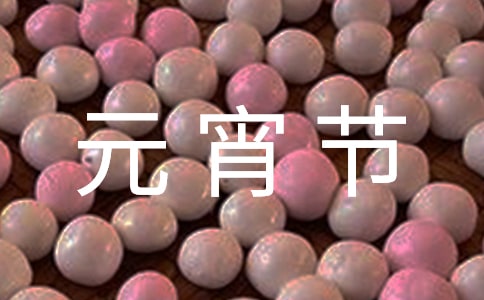- 相关推荐
元宵节来历英语带翻译
元宵节,也被称为“上元节”或“小正月”,是农历正月十五日,标志着春节庆祝活动的结束。这个节日历史悠久,深深植根于中国文化之中。以下是小编整理的元宵节来历英语带翻译,仅供参考,希望能够帮助到大家。

元宵节来历英语带翻译
The 15th day of the 1st lunar month is the Chinese Lantern Festival
because the first lunar month is called yuan-month and in the ancient times people called night Xiao. The 15th day is the first night to see a full moon. So the day is also called Yuan Xiao Festival in China.
According to the Chinese tradition, at the very beginning of a new year, when there is a bright full moon hanging in the sky, there should be thousands of colorful lanterns hung out for people to appreciate. At this time, people will try to solve the puzzles on the lanterns and eat yuanxiao (glutinous rice ball) and get all their families united in the joyful atmosphere.
元宵节正月十五吃元宵的的习俗由来已久,元宵也叫“汤圆”、“圆子”。据说元宵象征合家团圆,吃元宵意味新的一年合家幸福、万事如意。
元宵节闹花灯的习俗起源于道教的“三元说”;正月十五日为上元节,七月十五日为中元节,十月十五日为下元节。主管上、中、下三元的分别为天、地、人三官,天官喜乐,故上元节要燃灯。元宵节的节期与节俗活动,是随历史的发展而延长、扩展的。就节期长短而言,汉代才一天,到唐代已为三天,宋代则长达五天,明代更是自初八点灯,一直到正月十七的夜里才落灯,整整十天。与春节相接,白昼为市,热闹非凡,夜间燃灯,蔚为壮观。特别是那精巧、多彩的灯火,更使其成为春节期间娱乐活动的高潮。至清代,又增加了舞龙、舞狮、跑旱船、踩高跷、扭秧歌等“百戏”内容,只是节期缩短为四到五天。
元宵节来历英语带翻译
The Lantern Festival, also known as the "Yuanxiao Festival" or the "Shangyuan Festival," falls on the 15th day of the first lunar month, marking the end of the Spring Festival celebration. This festival has a long history and is deeply rooted in Chinese culture.
Legend has it that the Lantern Festival originated from the Han Dynasty, when Emperor Wu Di was praying to the gods for a prosperous reign. He dreamed of a god who told him that the gods would grant his wish if he could rid the world of all demons and diseases. Emperor Wu Di ordered his ministers to create a festival to celebrate this auspicious dream, and the Lantern Festival was born.
On this day, people release lanterns into the sky, symbolizing the release of their wishes and hopes for the future. Lanterns of various shapes and sizes are displayed, creating a festive and joyous atmosphere. People also eat "yuanxiao," which are small dumplings made of glutinous rice flour filled with sweet fillings. Eating yuanxiao is believed to bring good luck and family unity.
The Lantern Festival is not only a time for celebration but also a moment to reflect on the past year and look forward to the future. It represents the unity and prosperity of the Chinese people and is a cherished tradition that has been passed down through generations.
传说元宵节起源于汉朝,当时汉武帝祈求神灵保佑国家繁荣昌盛。他梦见一位神祇,神祇告诉他,如果他能驱除世间所有的恶魔和疾病,神灵就会实现他的愿望。汉武帝命令大臣们创造一个节日来庆祝这个吉祥的梦,于是元宵节便诞生了。
在这一天,人们放飞天灯,象征着释放他们的愿望和对未来的希望。各种形状和大小的灯笼被展示出来,营造出欢乐和喜庆的氛围。人们还吃“元宵”,这是一种由糯米粉制成的、内馅甜美的小汤圆。吃元宵被认为能带来好运和家庭团圆。
元宵节不仅是一个庆祝的时刻,也是一个反思过去一年和展望未来的时刻。它代表着中国人民的团结和繁荣,是一个通过几代人传承下来的珍贵传统。
元宵节来历英语带翻译
The Lantern Festival, also known as the "Festival of Lanterns," falls on the 15th day of the first lunar month, marking the end of the Spring Festival celebrations. This festival has a rich history and cultural significance in China.
Legend has it that the Lantern Festival originated from a story about a heavenly being named Tianhou, who desired to experience the joy of humanity. She descended to Earth and became a mortal woman, falling in love with a mortal man named Dong Yong. However, their love was forbidden by the gods, and Tianhou was eventually forced to return to Heaven. Dong Yong was so distraught that he jumped into a fire and died. In his memory, the villagers released lanterns into the sky, hoping to guide Tianhou back to Earth. This act evolved into the custom of releasing lanterns during the Lantern Festival.
The Lantern Festival is a time for family reunions and celebration. People admire the beautiful lanterns, which are often brightly colored and intricately designed. These lanterns are displayed in public places and in peoples homes, creating a festive atmosphere.
In addition to admiring lanterns, people also enjoy eating sweet dumplings called "yuanxiao," which symbolize family unity and happiness. These dumplings are usually filled with sweet red bean paste or other delicious fillings.
The Lantern Festival is not only a time for fun and celebration, but also a reminder of the importance of family and unity. It is a cherished tradition that has been passed down through generations, symbolizing the hope and joy of the Chinese people.
元宵节的来历
元宵节,又被称为“灯节”,是在农历正月十五这一天庆祝的,标志着春节庆祝活动的结束。这个节日在中国有着悠久的历史和丰富的文化内涵。
传说元宵节起源于一个关于天女田后的故事。她渴望体验人间的生活,于是降临凡间,成为了一个凡人女子,并与凡人董永相爱。然而,他们的爱情被天神所禁止,田后最终被迫返回天宫。董永非常悲痛,跳入火中死去。为了纪念他,村民们放飞灯笼到天空,希望引导田后回到人间。这个行为逐渐演变成了元宵节放飞灯笼的习俗。
元宵节是家人团聚和庆祝的时刻。人们欣赏美丽的灯笼,这些灯笼色彩鲜艳、设计精美。灯笼在公共场所和人们的家中展示,营造出节日的气氛。
除了欣赏灯笼,人们还喜欢吃叫做“元宵”的甜食,象征着家庭团圆和幸福。这些元宵通常填充着甜红豆沙或其他美味馅料。
元宵节不仅是欢乐和庆祝的时刻,也是提醒人们家庭和团结的重要性的时候。它是一个代代相传的珍贵传统,象征着中国人民的希望和快乐。
【元宵节来历英语带翻译】相关文章:
元宵节的来历 英语05-18
元宵节的来历英语05-18
面试英语自我介绍带翻译04-18
中国元宵节的来历及习俗 英语05-18
元宵节的来历英语版05-18
面试英语自我介绍范文带翻译04-15
万圣节英语作文带翻译05-14
万圣节英语作文(带翻译)05-14
志愿者面试英语自我介绍带翻译04-18